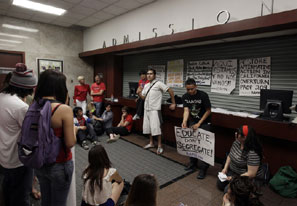Mary Antin was a Russian Jewish immigrant who came to the US with her family in 1894, at the age of thirteen. I briefly reviewed her 1912 book, The Promised Land, here.
Browsing through a used bookstore the other day, I saw a slightly later book by Antin: They who knock at our gates–a complete gospel of immigration (available here). It was published in 1914, at a time when immigration had become a very hot social and political issue, and is a highly polemical but pretty well-reasoned document. Antin’s key points and arguments are:
**The fundamental American statement of belief is the Declaration of Independence. “What the Mosaic Law is to the Jews, the Declaration is to the American people…Without it, we should not differ greatly from other nations who have achieved a constitutional form of government and various democratic institutions.” And “it was by sinking our particular quarrel with George of England in the universal quarrel of humanity with injustice that we emerged a distinct nation with a unique mission in the world.” Our loyalty to these principles is tested by our attitude toward immigration, “For the alien, whatever ethnic or geographic label he carries, in a primary classification of the creatures of the earth, falls in the human family.” This universalist view leads Antin to conclude that we are morally obligated to accept as many immigrants as we feasibly can–and we have room for many, many more. “Let the children be brought up to know that we are a people with a mission.”
**Contrary to the assertions being made in some quarters (in 1914), today’s immigrants are not of inferior quality to those of earlier eras. Jewish immigrants from Russia, for example, are pursuing religious liberty in a way directly analogous to the Pilgrims…indeed, “It takes a hundred times as much steadfastness and endurance for a Russian Jew of today to remain a Jew as it took for an English Protestant in the seventeenth century to defy the established Church”…and Russian Jews have shown great courage in the revolutionary movements against the Czar. Also, “We experienced a shock of surprise, a little while ago, when troops of our Greek immigrants deserted the bootblacking parlors and the fruit-stands and tumbled aboard anything that happened to sail for the Mediterranean, in their eagerness..to strike a blow for their country in her need….From these unexpected exploits of the craven Jew and the degenerate Greek, it would seem as if the different elements of the despised “new” immigration only await a spectacular opportunity to prove themselves equal to the “old” in civic valor.” Recent immigrants have also distinguished themselves in their avid pursuit of educational opportunities. “Bread isn’t easy to get in America,” Antin quotes a widow on Division Street, “but the children can go to school, and that’s more than bread.”
**Many of the problems associated with immigrant communities are actually the fault of bad municipal administration. “You might dump the whole of the East Side into the German capital and there would be no slums there, because the municipal authorities of Berlin know how to enforce building regulations, how to plant trees, and how to clean the streets….If the slums were due to the influx of foreigners, why should London have slums, and more hideous slums than New York?”
**Those who choose to become immigrants, from whatever, country, represent that best of that population. “Some of the best blood of New England answered the call of “Westward ho!” when the empty lands beyond the Alleghenies gaped for population…Of the aristocracy of New England that portion stayed at home which was fortified by wealth, and so did not feel the economic pressure of increased population; of the proletariat remained, on the whole, the less robust, the less venturesome, the men and women of conservative imagination. It was bound to be so, because wherever the population is set in motion by internal pressure, the emigrant train is composed of the stoutest, the most resourceful of those who are not held back by the roots of wealth or sentiment. Voluntary emigration always calls for the highest combination of the physical and moral virtues.”
Hence, the United States has practical as well as moral reasons to maximize immigration. Antin does not demand an absolutely uncontrolled immigration policy–“I do not ask that we remove all restrictions and let the flood of immigration sweep in unchecked”–she seems to be OK with health checks, and she calls for deportation of immigrants who have committed crimes–but does assert that the gate should be opened as wide as possible.
A quite different view of mass immigration can be found (oddly enough) in one of George MacDonald Fraser’s picaresque Flashman novels (link). In this passage, the anti-hero Flashman speaks very much out of character, soberly and thoughtfully in what is probably the author’s own voice, about the American Indian experience of European movement to their lands.


